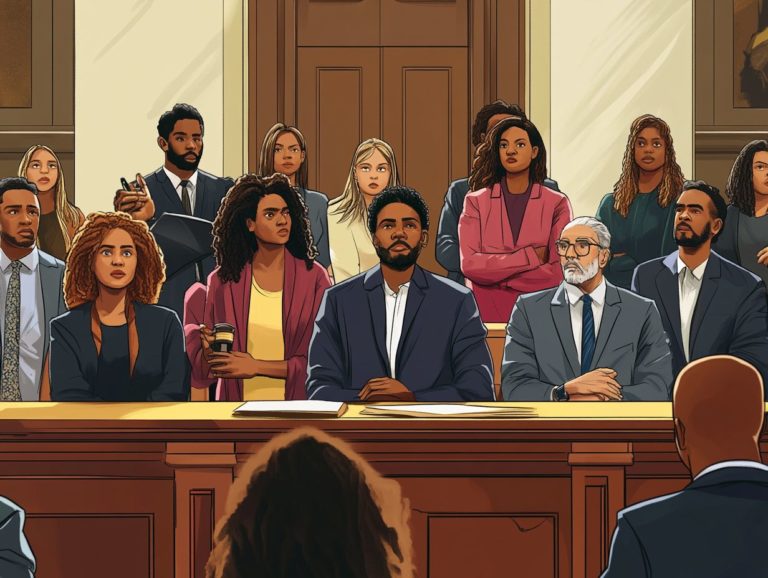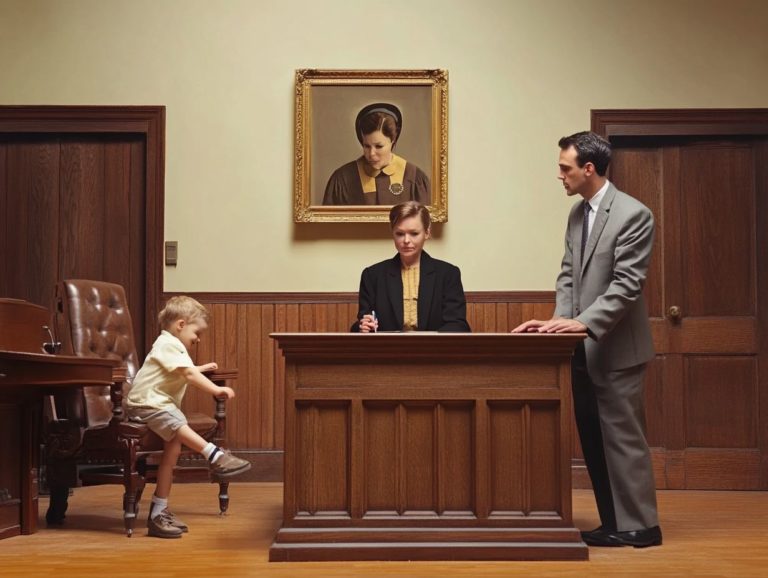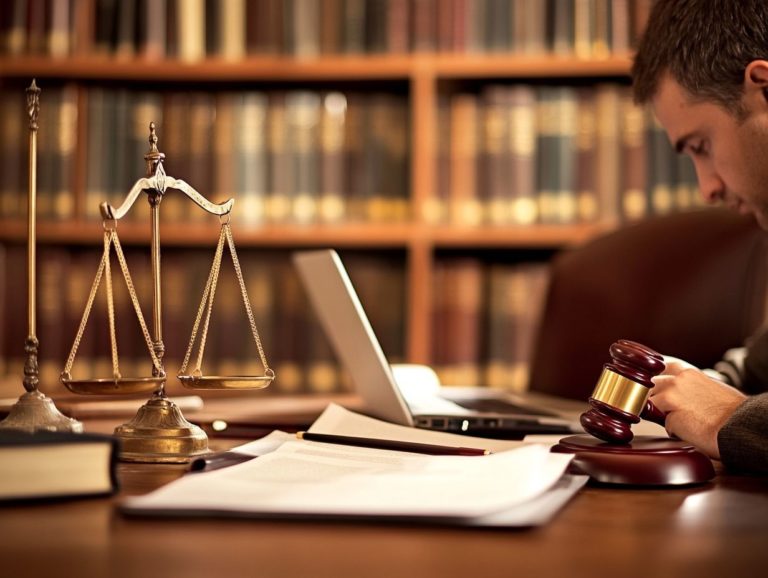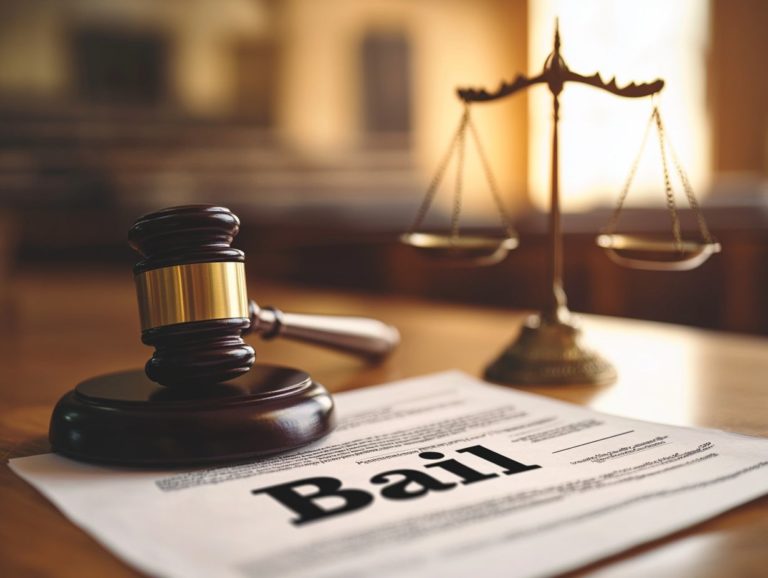The Right to Confront Witnesses
The right to confront witnesses stands as a cornerstone of a fair legal system, empowering defendants to effectively challenge the evidence presented against them.
Let s explore the legal principles that support this right, tracing its origins and evolution throughout history. You will discover its constitutional foundation in the Sixth Amendment, consider exceptions that may apply, and reflect on contemporary challenges that arise within the courtroom.
By reviewing recent cases and interpretations, you ll gain a comprehensive understanding of this fundamental aspect of justice.
Contents
- Key Takeaways:
- Overview of the Right to Confront Witnesses
- History of the Right to Confront Witnesses
- Constitutional Basis for the Right
- Exceptions to the Right to Confront Witnesses
- Challenges to the Right to Confront Witnesses
- Controversies and Legal Battles
- Current State of the Right to Confront Witnesses
- Frequently Asked Questions
- What is the Right to Confront Witnesses?
- Where is the Right to Confront Witnesses found?
- Why is the Right to Confront Witnesses important?
- Are there any exceptions to the Right to Confront Witnesses?
- Can the Right to Confront Witnesses be waived?
- What happens if the Right to Confront Witnesses is violated?
Key Takeaways:
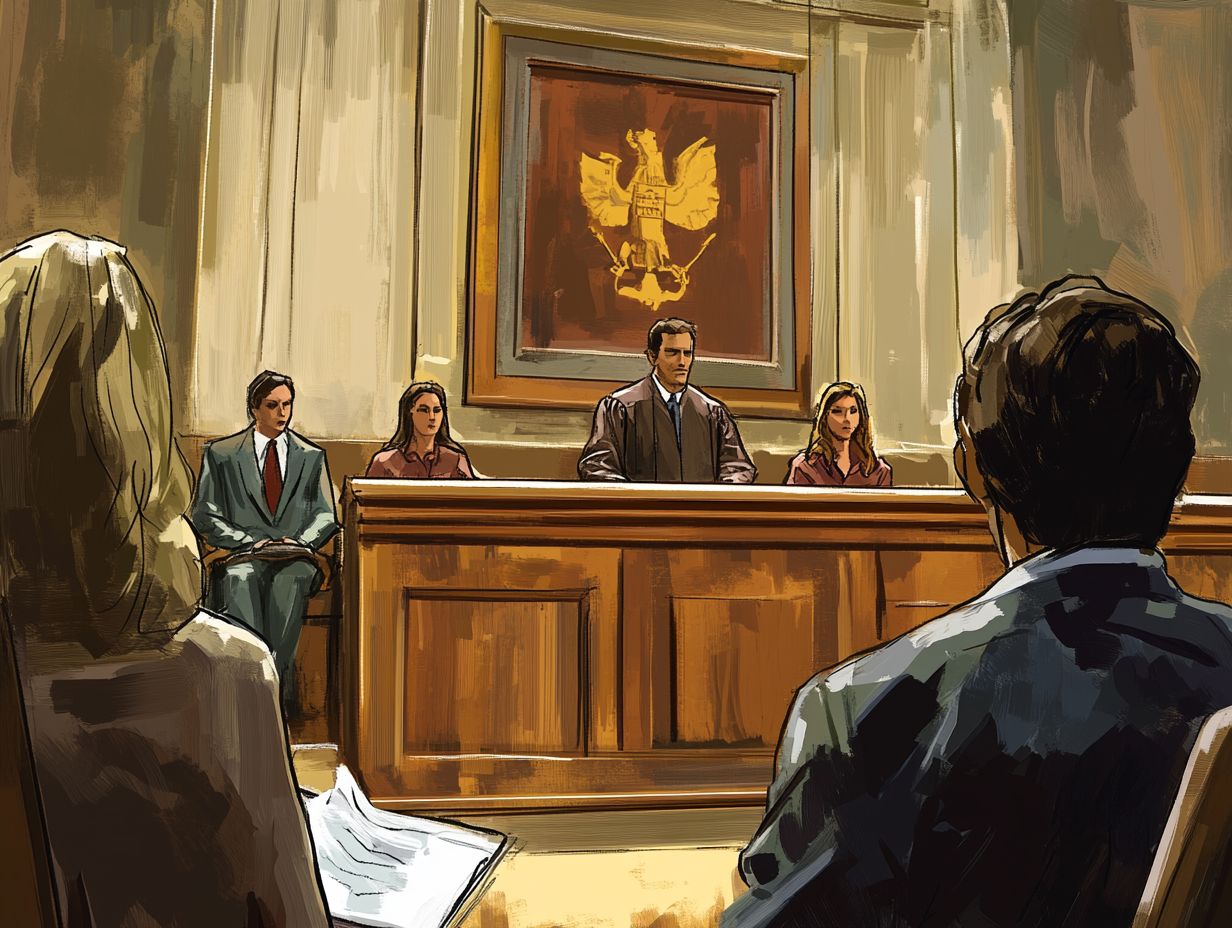
- The right to confront witnesses is a fundamental legal principle that ensures a fair trial and protects the accused from unreliable or false testimony.
- Originating in English common law, this right has evolved and is now constitutionally protected under the Sixth Amendment in the United States.
- While there are some exceptions to the right, challenges to its application continue to arise in the legal system.
Overview of the Right to Confront Witnesses
The right to confront witnesses against a criminal defendant is a fundamental principle embedded in the Constitution, specifically within the Sixth Amendment. This essential right acts as a safeguard within the criminal justice system, ensuring that you can challenge the credibility of witnesses through cross-examination.
The Confrontation Clause is crucial for maintaining fair legal proceedings, enabling you to engage meaningfully with witness testimony. This process reinforces your constitutional rights and enhances the overall fairness of the judicial system.
Explanation of the Legal Principle
The legal principle supporting your right to confront witnesses is vital for safeguarding your rights as a criminal defendant during trials.
This fundamental right gives you and your defense attorney the power to carefully look for inconsistencies or biases in witness testimonies. During cross-examination, you gain a crucial opportunity to spotlight potential inaccuracies in the evidence brought against you.
This process plays a significant role in verifying witness statements and protects the integrity of the judicial system.
By facilitating a thorough exploration of all perspectives, this mechanism cultivates a fair environment that upholds justice, ensuring that you are not wrongfully convicted based on unreliable or questionable testimony.
History of the Right to Confront Witnesses
The right to confront witnesses has its roots in English Common Law, where the essential need for a defendant to face their accusers was acknowledged as a cornerstone of a fair trial.
Over the years, this legal principle has undergone significant evolution, shaping modern legal frameworks and the interpretation of defendants’ rights in the United States.
This evolution mirrors broader societal shifts regarding justice, accountability, and the important role of witnesses within the criminal justice system.
Origins and Evolution of the Right
The origins of your right to confront witnesses can be traced back to influential Supreme Court cases like Mattox v. United States and Lee v. Illinois, which laid the foundation for contemporary interpretations.
These landmark decisions are far more than mere historical footnotes; they established essential legal precedents that continue to shape the judicial landscape you encounter today.
By prioritizing the defendant’s ability to challenge the credibility of witnesses in person, the Court underscored the crucial role of cross-examination as a safeguard against wrongful convictions.
As legal scholars dissect subsequent cases, it becomes clear how the principles articulated in these early rulings resonate in modern discussions about due process and fair trial rights, influencing how courts engage with complex evidentiary standards and uphold the rights of defendants in today s legal framework.
Constitutional Basis for the Right
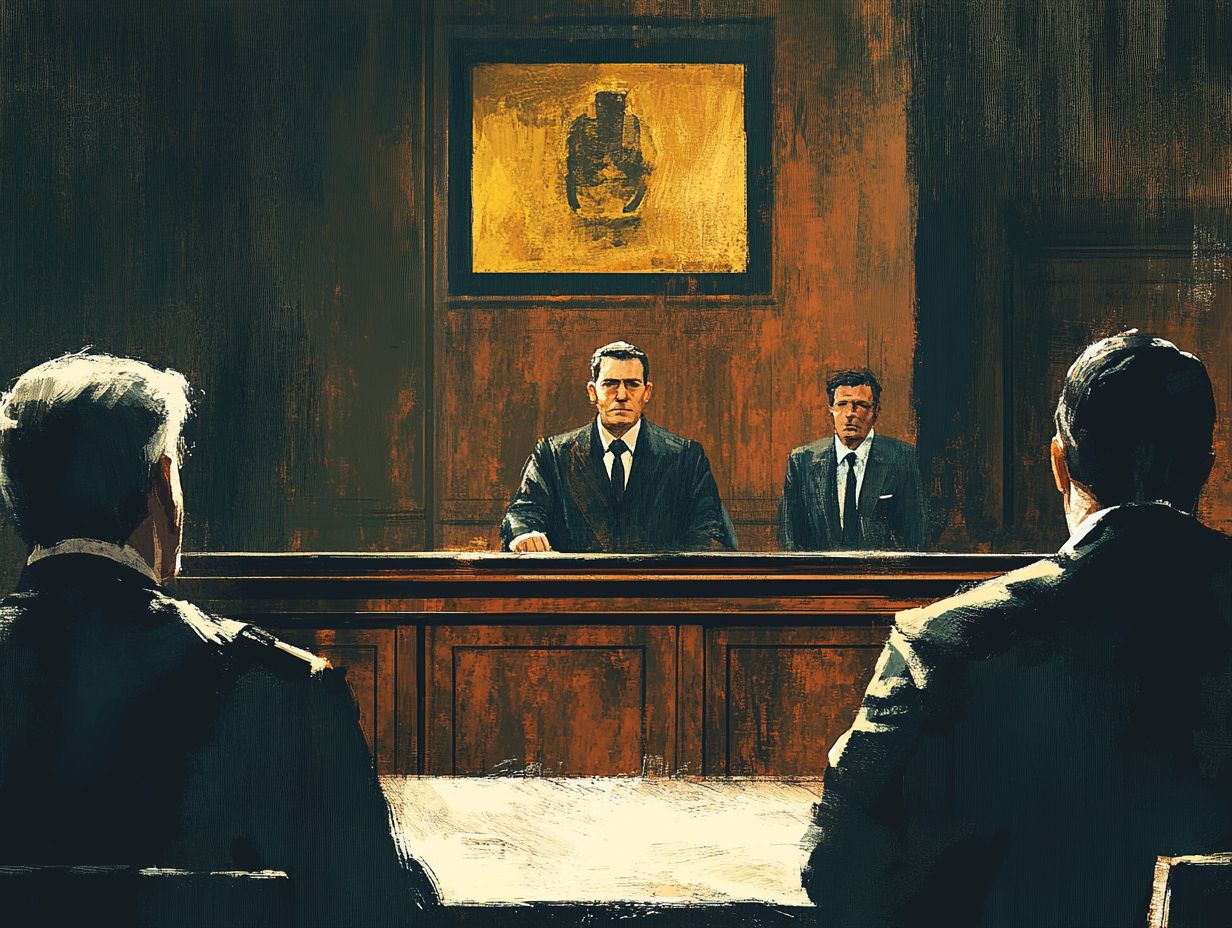
The constitutional foundation for your right to confront witnesses is firmly anchored in the protections afforded by the Sixth Amendment. This Amendment grants you crucial rights during criminal prosecutions, including the right to question the witnesses against you.
By ensuring you can confront evidence presented, it upholds your constitutional rights and plays a vital role in making sure trials are fair. Furthermore, the Fourteenth Amendment fortifies these protections by extending the Sixth Amendment’s application to state courts, highlighting the significance of this right within the larger legal landscape.
Protections Under the Sixth Amendment
The protections under the Sixth Amendment are essential for you as a criminal defendant. They provide the opportunity to assess the credibility and reliability of witnesses through direct questioning.
This fundamental right gives you the power to not only question witnesses but also equips the jury with the necessary tools to evaluate the truthfulness of testimonies presented during the trial.
Through questioning witnesses directly, you can uncover inconsistencies and biases that directly influence how reliability is perceived. Such scrutiny safeguards your rights while upholding the integrity of the judicial process.
Ultimately, this meticulous evaluation can be pivotal in determining the outcome of your trial, highlighting the huge importance of the Sixth Amendment in your case.
Exceptions to the Right to Confront Witnesses
The right to confront witnesses is undeniably a cornerstone of the criminal justice system. However, there are significant exceptions and limitations that can emerge under specific circumstances, especially concerning hearsay evidence.
Hearsay evidence is when someone reports what another person said, rather than what they experienced themselves. These nuances can introduce complex legal challenges that may hinder your ability to fully exercise your constitutional rights.
Therefore, grasping these limitations is essential for you and your legal representatives as you navigate the intricate landscape of the criminal justice system.
Limitaciones y Circunstancias
The limitations on your right to confront witnesses often stem from the government’s interest in law enforcement and the availability of those witnesses. This delicate balance can significantly influence your ability to challenge the credibility of those testifying against you.
When witnesses become unavailable due to legal maneuvers or unforeseen circumstances, the integrity of your trial can be compromised. While the government is pursuing justice, it may inadvertently sideline your rights to fully engage in your defense.
This can create a situation where the pursuit of efficiency clashes with the fundamental principles of a fair trial, raising concerns about whether true justice is being served. These situations can affect the justice you receive and the public’s trust in the system.
Challenges to the Right to Confront Witnesses
The right to confront witnesses has encountered numerous challenges throughout history. These challenges often give rise to controversies and legal battles, particularly around the right to present evidence in your defense, revealing the delicate balance between defendants’ rights and prosecutorial interests.
These obstacles can profoundly influence the strategies adopted by criminal defense attorneys as they navigate the intricate landscape of the legal system. Understanding these challenges is critical for your defense don t underestimate their importance!
Controversies and Legal Battles
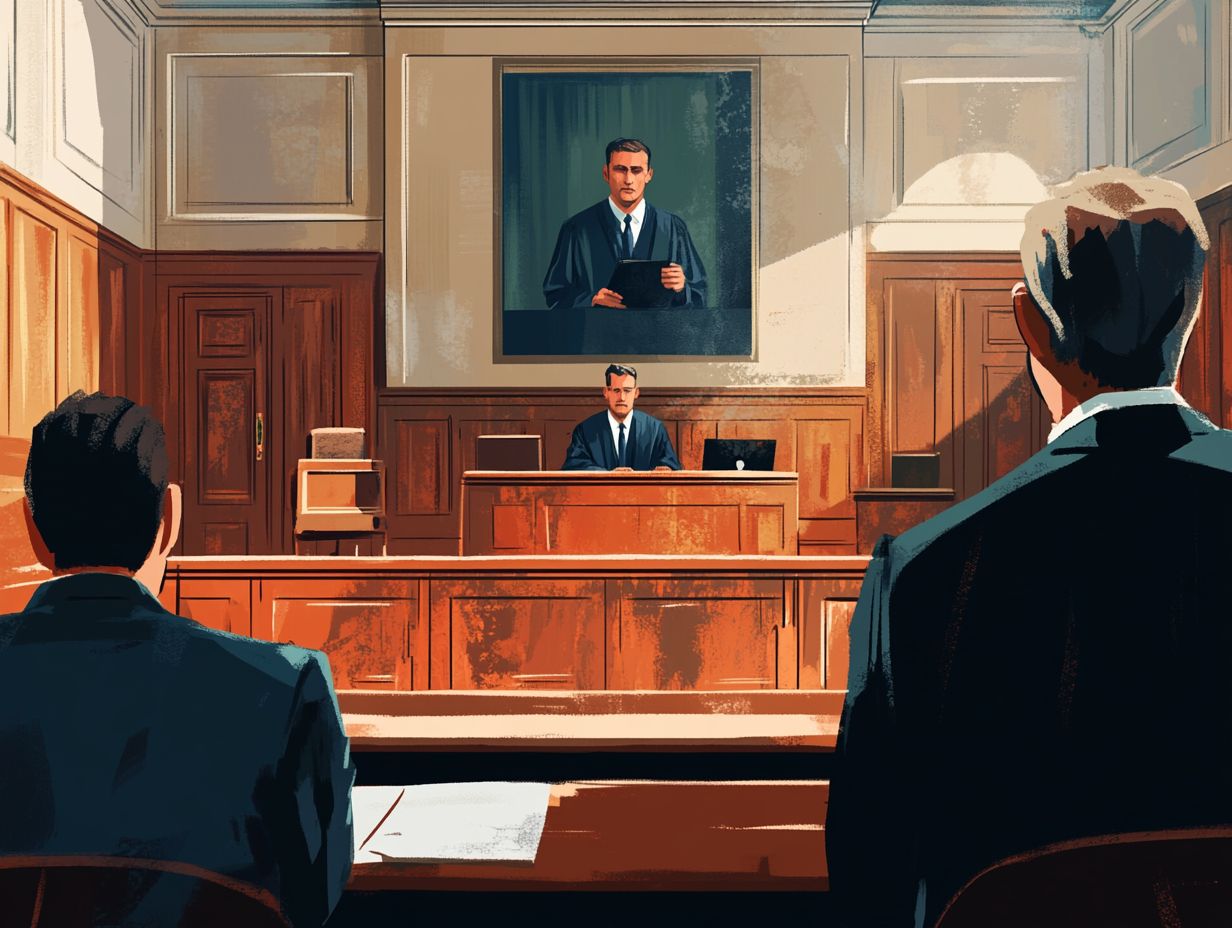
Controversies surrounding the right to confront witnesses emerge in landmark cases like Crawford v. Washington and Smith v. Illinois. In these cases, the Supreme Court addressed critical issues related to hearsay and witness confrontation.
These rulings influence how evidence is presented in courtrooms nationwide. They emphasize the right to cross-examine witnesses, highlighting fairness and due process in the criminal justice system.
The outcomes of these cases resolve specific legal dilemmas and establish crucial precedents. Consequently, they reinforce the idea that a fair trial relies on your ability to challenge the evidence against you, aligning with core ideals of justice.
Current State of the Right to Confront Witnesses
The current landscape of the right to confront witnesses shows ongoing interpretations in recent legal cases. This illustrates its changing role within the criminal justice system.
Legal debates continue, pushing law offices and criminal defense attorneys to adapt their strategies in response to new precedents.
This dynamic environment highlights the importance of staying informed about new developments regarding the right to confront witnesses and their implications for defendants.
Recent Cases and Interpretations
Recent cases illuminate how your right to confront witnesses applies in today s criminal justice system. This evolving legal landscape has sparked significant discussions among legal scholars and practitioners.
Important rulings, especially regarding hearsay exceptions and the admissibility of statements made outside the courtroom, challenge traditional views of defendants’ rights. Notably, Crawford v. Washington reshaped expectations, emphasizing the importance of direct testimony and in-person confrontation.
These changes significantly impact trial procedures, ensuring you can engage more actively with the evidence against you. Understanding these developments is essential for anyone wishing to engage in meaningful dialogue about justice and fairness in the courtroom.
Frequently Asked Questions
What is the Right to Confront Witnesses?
The Right to Confront Witnesses is a legal principle ensuring that criminal defendants can confront and cross-examine witnesses against them in court.
Where is the Right to Confront Witnesses found?
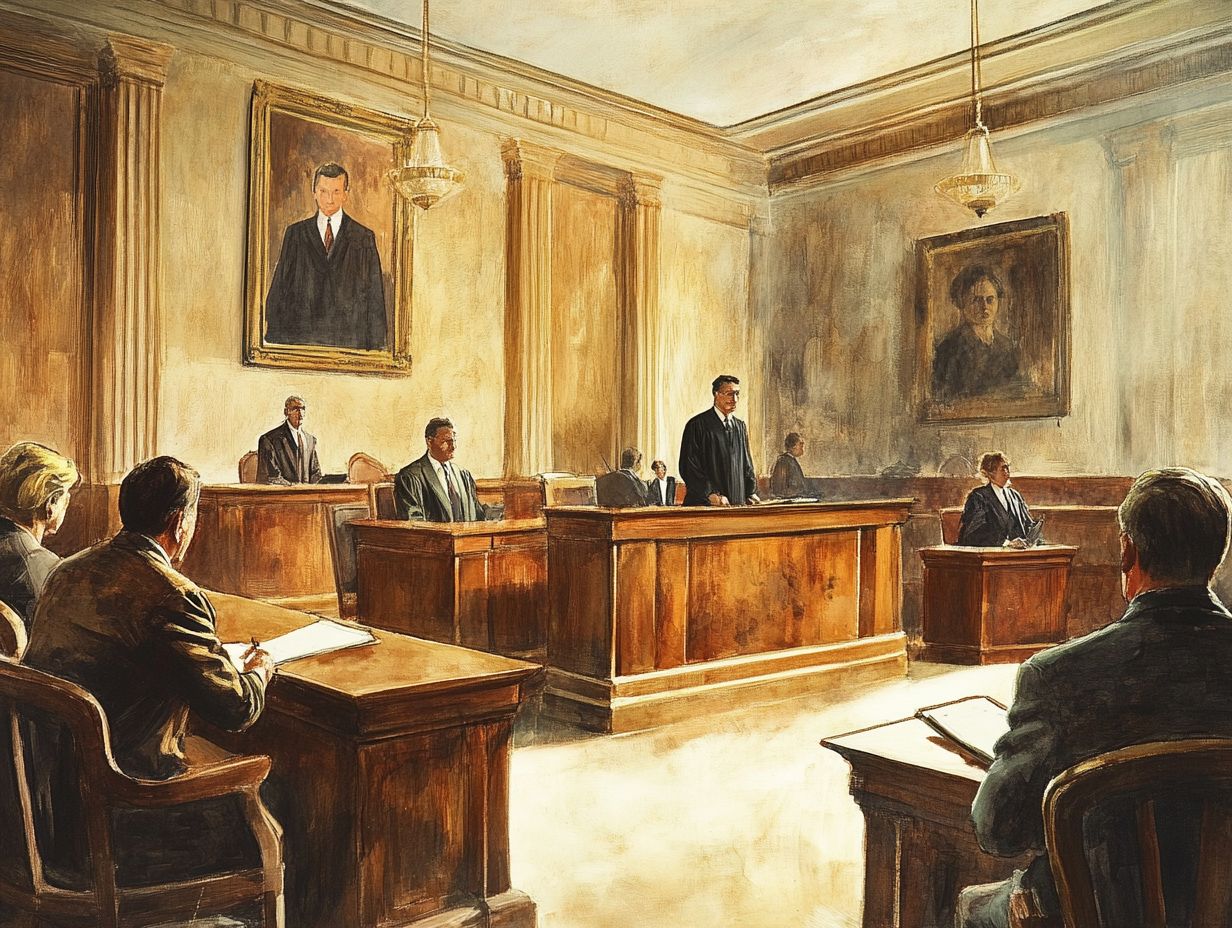
This right is found in the Sixth Amendment of the United States Constitution. It states that “In all criminal prosecutions, the accused shall enjoy the right…to be confronted with the witnesses against him.”
Why is the Right to Confront Witnesses important?
This right ensures that the evidence presented against a defendant is reliable and accurate. By cross-examining witnesses, a defendant can challenge testimony and reveal inconsistencies or biases.
Are there any exceptions to the Right to Confront Witnesses?
Yes, there are some exceptions. For instance, if a witness is unavailable to testify, their previous testimony may be admitted as evidence. However, these exceptions are limited and evaluated case by case.
Can the Right to Confront Witnesses be waived?
Yes, the Right to Confront Witnesses can be waived if a defendant voluntarily chooses not to cross-examine a witness. This decision must be made knowingly and voluntarily; it cannot be forced.
What happens if the Right to Confront Witnesses is violated?
If this right is violated, it may lead to a mistrial or the conviction being overturned on appeal. However, the violation must significantly impact the case outcome for this to occur.
For more information about your rights, consider seeking legal advice or exploring further resources on this important topic.


